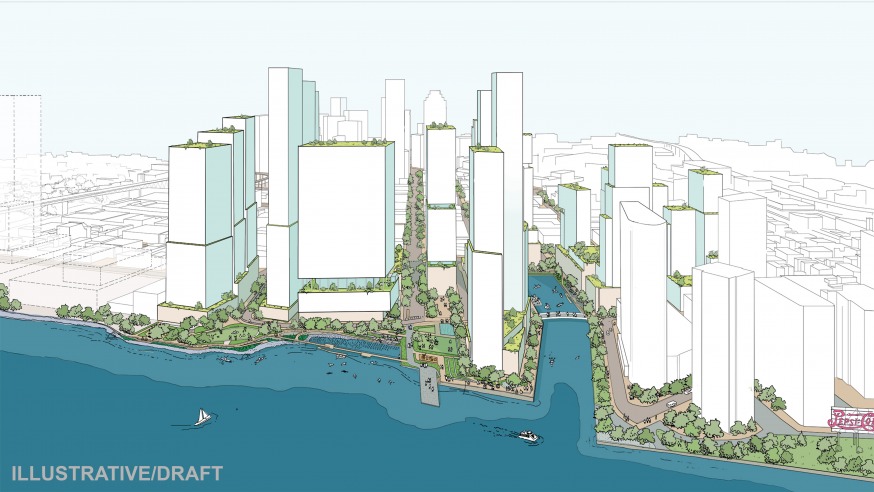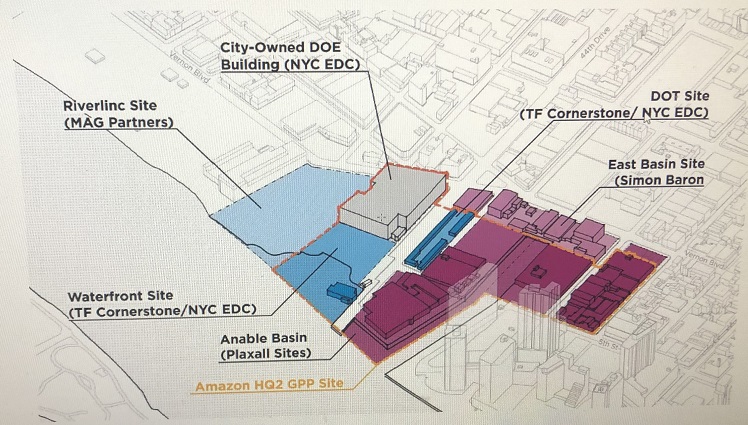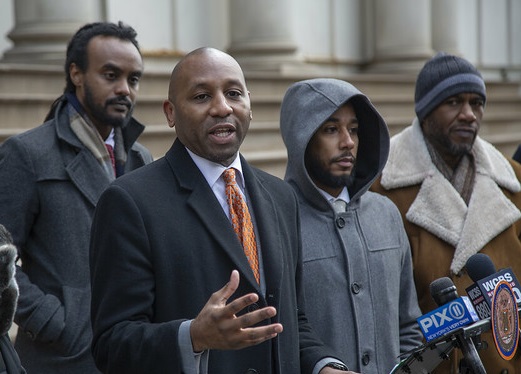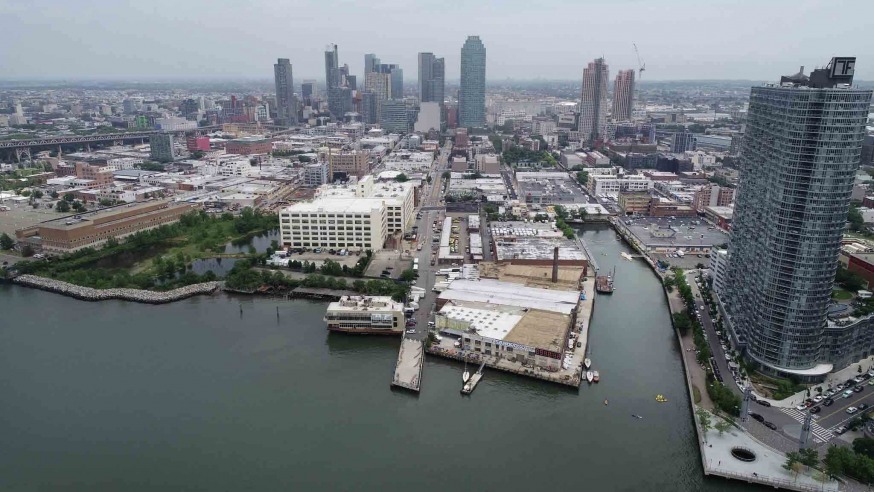
Rendering YourLIC
Aug. 11, 2020 By Christian Murray
Council Member Donovan Richards announced his support last week for the YourLIC development plan proposed for the Long Island City waterfront.
Richards, who is likely to be the next Queens Borough President come Jan. 1, said that he supports the overarching plan that involves the development of a 28-acre section of land surrounding Anable Basin, which incorporates sites where Amazon HQ2 was slated to go.
His support for the project is based around the jobs it would bring and the affordable housing units that would be built. The developers say that the project is likely to lead to the creation of 26,000 permanent jobs when it is fully built out—although they did not specify the type of jobs. The plans would bring 1,400 affordable units, although the rental prices and who would qualify has yet to be announced.
The development team–consisting of TF Cornerstone, Plaxall, Simon Baron Development and MAG Partners–is looking to construct 15 buildings totaling 10 to 12 million square feet that range in height from 400 feet to 700 feet. The plans also include seven acres of open space.

(Rendering: YourLIC) The TF Cornerstone/NYC EDC sites are both publicly-owned. Critics want these sites to remain in public hands.
The developers—with the exception of TF Cornerstone—each own a portion of the 28 acre area. TF Cornerstone is looking to develop two city-owned lots on 44th Drive, which are part of the 28-acre area.
The parcels need to be rezoned in order for the plan to move forward, which calls for 50 percent of the space to be commercial, 30 percent residential and the remainder a mix of community and art space—including three new schools.
The plans also include 5,700 apartment units—25 percent to be affordable in accordance to the city’s Mandatory Inclusionary Housing requirements.

Donovan Richards (Photo: City Council)
Richards’ opinion matters since he is almost certain to be the borough president next year and will get a say—albeit advisory—on any rezoning plan. The developers plan to start the ULURP process in 2021.
“As we battle massive inequality across Queens, the Long Island City Waterfront presents a key opportunity to create new jobs, affordable housing, a community land trust, and much-needed community facilities,” Richards said in a statement.
“We need ambitious proposals that will bring significant private and public investment into communities that have long endured disparities based on their socio-economic status,” Richards added.

An aerial view of Anable basin, where Amazon had planned on building its new headquarters and where the YourLIC development is proposed. (Kevin P. Coughlin/Office of Governor Andrew M. Cuomo)
The plan, which like all rezonings needs to be approved by the city council, has already been rejected by local representative Council Member Jimmy Van Bramer.
Typically, rezonings don’t pass the city council if the member representing the district where the development is proposed does not approve.
Van Bramer, who was called on by activists to reject the proposal for a plethora of reasons including concerns of gentrification, issued a letter announcing his opposition to the proposal last month.
“I agree with you that the proposal for 12 million square feet, twice the height and density of Hunters Point South, is wrong for our community,” he wrote. “There is no question that this project as proposed would cause rents to rise in the surrounding community.”
Van Bramer has not yet commented as to what would be an acceptable plan–if any. However, he has accused its supporters as being “REBNY yes men.”
The role of Council Speaker Corey Johnson and whether he will weigh in on the impending rezoning plan–and ultimately the city council vote–remains uncertain.
The developers were brought together by Council Speaker Corey Johnson last year to create a comprehensive plan in the first place. He called for the developers to engage with the public in formulating a plan following Amazon’s decision not to come to the waterfront.
Johnson has made it clear in the past that he would not allow any single council member to act as an obstacle to a project he deems worthwhile with benefits for a community. He told reporters two years ago at a CUNY Graduate School of Journalism forum that local council members will get “deference” but “no veto” on land use matters.

Council Speaker Corey Johnson (Photo: City Council)
“No one gets a veto,” Johnson said. “There’s a difference between deference and a veto. If someone is opposing a project or asking for things that are totally unreasonable, someone needs to step in and say, ‘that doesn’t make any sense.’”
Johnson was asked by the Queens Post last week if he still holds that opinion. His office declined to comment.
However, when asked whether he would be prepared to back the YourLIC project without Van Bramer’s support, his office said that the project has yet to be filed so it would be premature to comment.
Critics of the plan– particularly groups such as the LIC Coalition and Western Queens Community Land Trust– argue that the community has not been fully engaged by the developers in formulating a plan for the area. They argue that the workshops that YourLIC has held– three in person and two online due to COVID-19– were too top down, describing them as “well orchestrated events.”
The critics also want the two city-owned lots on 44th Drive to be for public use. They are also concerned that such development would overwhelm the infrastructure and are concerned about flooding.
Richards said that he plans on speaking up about the project and rejects the naysayers.
“I’ll have an advisory opinion,” he told City & State last month. “But I will say, I intend to play an outsized role in these conversations – more aggressively than what we’ve seen in the past.”
2 Comments

One word:
Flooded
Will Queens Boro President Elect Donovan Richards avoid any conflicts of interest by refusing to accept any campaign contributions from the developers, lobbyists and others who would benefit by this project?
Record construction in Long Island City has not been accompanied by any significant increase in transit capacity to accommodate thousands of new residents. The same is true for thousands more who commute from other neighborhoods to jobs in LIC.
There are opportunities to increase capacity and service by running trains more frequently mid-day, evenings, overnight and weekends on the #7 line. Until the 1980’s, there was Manhattan bound express service till 12:30 PM. Flushing bound express service began after 1 PM. There has been no express service between 10 AM and 3 PM due to periodic ongoing track, power, signal, and routine maintenance projects for decades.
There are opportunities to increase capacity and service by running trains more frequently mid-day, evenings, overnight and weekends for both the #7 and G subway lines. There is always equipment used primarily for rush hour peak service that is available to provide additional service during off peak hours. It is a question of finding millions of dollars more to cover operating costs for additional service.
Why not extend 8 of 14 Long Island Rail Road trains currently terminating at Hunters Point during AM rush hour to LIC? Turn trains around to provide reverse commuter service. In the PM rush hour, start 7 of 12 trains from LIC instead of Hunters Point. Establish new off peak, mid day and evening service between LIC and Jamaica.
New ferry services will be able to accommodate only so many riders. In many cases, a majority of new residents and employees will need the subway rather than the ferry to access employment, educational, medical and entertainment opportunities in Manhattan and other boroughs. The continued economic success of new business coming to LIC is dependent upon not only additional transportation capacity, but capital improvements to sewer, water, electrical and utility assets as well. Municipal fire, police and sanitation services along with schools will also have to be expanded. What is the cost and who will pay for all these additional capital improvements and services?
(Larry Penner is a transportation advocate, historian and writer who previously worked 31 years for the Federal Transit Administration Region 2 NY Office.)